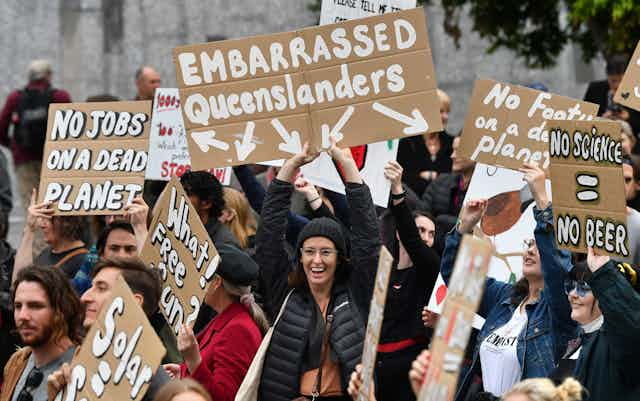So much for Australia’s “climate election”. In the event, voters in last month’s federal poll didn’t put climate policy at the top of their wish list.
Contrary to opinion polls predicting a groundswell of support for Labor’s relatively progressive agenda on climate and economics, the election results revealed that Australians are more divided on climate change than we thought.
Read more: Australians disagree on how important climate change is: poll
Voters for progressive climate policy were dismayed at the re-election of a prime minister who famously brought a lump of coal into Parliament. Perhaps understandably, one of the immediate responses among these progressive voters was to express anger at those who don’t share their concern.
But anger feeds a divisive politics that cannot help us to address our big collective challenges. By retreating into social media echo chambers where mockery and disrespect are the norm, we risk losing entirely the social cohesion and trust needed for democracy to work.
A whole-of-society discussion about our collective future is urgently needed. Now is the time to reinvent how we communicate about climate change, particularly with those who don’t see it as an urgent concern. Here’s how.
Addressing the ‘climate-unconcerned’
Contrary to the assumption that unconcern about climate change is evidence of selfishness or politically motivated denial, our research shows that people who resist climate concern are just as likely to be caring, ethical and socially minded as anyone else.
While there is a small minority of people who actively campaign against climate action, within society at large, those who are simply unconcerned about the climate crisis encompass a broad range of political views and levels of political engagement.
Far from being prejudiced, unreasonable, apathetic or ignorant, our studies in Australia and the UK show that many people who are unconcerned about the climate nevertheless care about issues including justice, the common good, and the health of ecosystems.
Belonging to a social group that doesn’t have its own narratives of climate concern is one of the most common reasons for unconcern. People who are unconcerned about climate change often see it as a “greenie” issue. If they identify themselves as opposed to green politics, they are unlikely to prioritise calls for climate action.
The rural/city divide also plays a key part in polarising narratives of climate action, as regional and outer-urban Australians, who are more likely to be economically dependent on natural resources, feel ignored and devalued by policies designed to appeal to capital city electorates. If we want to break down polarisation on climate change, we need to understand what matters to rural and conservative social groups.
Bridging the divide
Our findings suggest a set of principles for engaging with people who are unconcerned about climate change:
Respect difference. Don’t assume that being unconcerned about climate change is a moral failing. People have other active concerns that are no less valid.
Listen. Build relationships with people who have different life experiences to your own, by asking what is important to them. Appreciate that some people may find social change more threatening and immediate than climate change. Empathising with this feeling can foster understanding of the core concerns that underpin resistance to change, and potentially help identify ways to address these concerns.
Value values. Avoid arguments based on appeals to the authority of science, or the consensus of expert opinion. “Debating the science” is a red herring – people’s responses to claims about climate change are motivated primarily by what they value, and the narratives of their social group, not their acceptance of scientific fact. Focus on values you might have in common, rather than getting caught up in disputes over facts.
Move beyond Left and Right. Don’t conflate political ideology with stance on climate. Showing that climate is not a defining issue for social groups is really important to avoid polarisation. We need to work against the idea that action on climate is an exclusively left-wing or “greenie” agenda.
Adopting these principles can help to build a political culture around climate science and policy that responds to the different priorities of Australians, all of whom are simply seeking a safe and secure future. This approach recognises that no action on climate change is possible without public trust and involvement in democratic institutions.
What can we learn from the UK?
Australia’s parliamentary system and media environment have much in common with that of the UK. Although the UK has not been immune to political divisions on climate change, with levels of concern typically higher on the political left than on the right, Britain has maintained a bipartisan approach.
With the help of intiatives supporting a pluralistic approach to climate policy discussions, the UK Climate Change Act passed into law in 2008 with almost unanimous cross-party support.
Read more: The UK has a national climate change act – why don't we?
Research in the UK has provided an evidence-based set of language and narratives to use when discussing climate change. This is focused on core socially conservative values such as maintaining the status quo (protecting it from a changing climate), avoiding waste (of household energy), and investing in secure (renewable) energy. There is also a push to reinvigorate democratic debate through citizens’ assemblies on climate change.
Now is the time for Australians to listen to each other, and develop a pluralistic approach to discussions on our shared future. The alternative is to sink deeper into partisan hostility and recrimination. And after a decade of division on climate policy, is that really the best way forward?
Join author Chloe Lucas at 3pm today for a live Q&A. Post your questions about #ClimateChange politics in the comments section below and she will answer.

